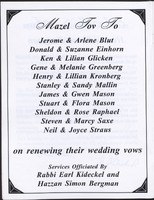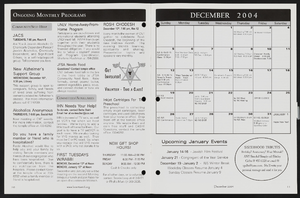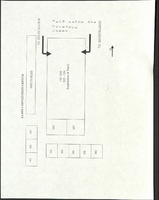Search the Special Collections and Archives Portal
Search Results

Program for The Wedding event at Temple Beth Sholom, June 11, 1995
Date
Archival Collection
Description
Booklet for the Wedding celebrations and vow renewals of couples at Temple Beth Sholom.
Text

Meeting minutes for Consolidated Student Senate, University of Nevada, Las Vegas, December 17, 1974
Date
Archival Collection
Description
Text

Mario Sandoval interview, December 6, 2018: transcript
Date
Archival Collection
Description
Interviewed by Claytee White. Mario and his six siblings were reared by a single mother who taught him all of the family recipes. Moving to Las Vegas at four years of age Mario remembers moving into a black neighborhood where the family was not welcomed. All windows in their home were broken into the first night. The family moved the next day. Though the new house was still in an African American neighborhood, they were protected by Vera, their black babysitter. Mario developed the intense work ethic of his mother, and after working in several strip casinos, found his home at the Horseshoe, today's Binion's. He has been there for 33 years; first as a busboy and then becoming a waiter. He is a Culinary Union trained shop student who picketed his beloved work place for ten months during a 1980's labor dispute. His work in life and union benefits have made his a very good life.
Text

Transcript of interview with Isabella Jessie Curtis by Andrew B. Levy, February 15, 1979
Date
Archival Collection
Description
On February 15, 1979, Andrew Levy interviewed Isabella Jessie Curtis (born 1922 in Monroe, Wisconsin) about her experiences in Southern Nevada. Curtis first talks about her career in waitressing at several restaurants and casinos in Las Vegas before describing some of the early businesses in the Downtown Las Vegas area. The interview then moves to discussions on Curtis’s involvement in politics, her early recreational activities, and the atomic testing. The two later discuss the first telephones in Las Vegas, the Helldorado celebration, and her work at the Tropicana Las Vegas. The interview concludes with Curtis’s description on living in Sandy Valley, Nevada, and some of her first memories of the Union Pacific train depot in Las Vegas.
Text

Theresa Thomas interview, March 13, 1995: transcript
Date
Archival Collection
Description
Thomas discusses her early life in Thistle, Utah before moving to Las Vegas, Nevada in approximately 1931, where her father worked on the Hoover Dam (Boulder Dam) construction. Thomas then talks about her early schooling in Boulder City, Nevada, her experiences as a swing and dance band musician, Block 16 in the Clark Las Vegas Townsite, and her memories of Las Vegas hotels and casinos. Other subjects Thomas covers include Las Vegas entertainers, entertainment venues, and women in the music industry during the 1930s.
Text

Transcript of interview with Joseph Gemma by Dan Murphy, March 1, 1979
Date
Archival Collection
Description
On March 1st, 1979, collector Dan Murphy interviewed Anderson Dairy production manager, Joseph Gemma (born on October 25th, 1934 in Norwalk, Connecticut) in his home in Las Vegas, Nevada. This interview covers the history of Las Vegas, including employment opportunities, construction work, housing developments, and the hotels on the Strip. Joseph also recalls social and environmental changes and local recreation, including sports and the importance of gaming in Nevada.
Text

Transcript of interview with Lawrence Hadland by Lorraine Owens, February 2, 1979
Date
Archival Collection
Description
On February 2, 1979, collector Lorraine Owens interviewed nurseryman, Lawrence Hadland (born November 16th, 1919 in Long Island, New York) in his home in Las Vegas, Nevada. This interview covers the life and times of “Nurseryman Hadland,” and offers insights into local business, family life, jobs, and the overall community of Las Vegas. He also discusses the military and the local airport.
Text

Transcript of interview with Sally Halko by Roberta Farmer, March 11, 1978
Date
Archival Collection
Description
On March 11, 1978, Roberta Farmer interviewed Sally Halko (born 1921 in Gowen, Oklahoma) about her life in Las Vegas, Nevada. Halko first talks about her family background, education, traveling, and church membership. She later talks about the development Las Vegas casinos, racial minorities, housing growth, Lake Mead, and the first theaters.
Text


